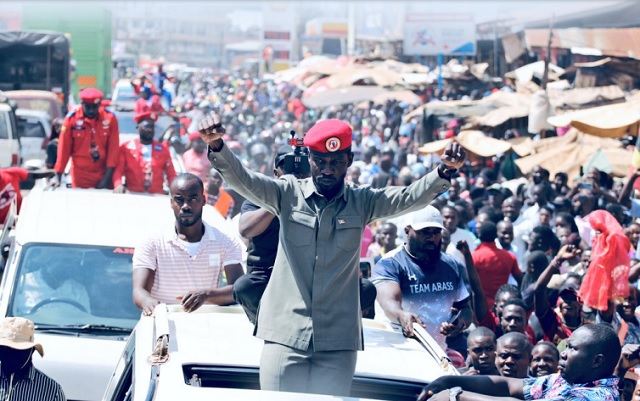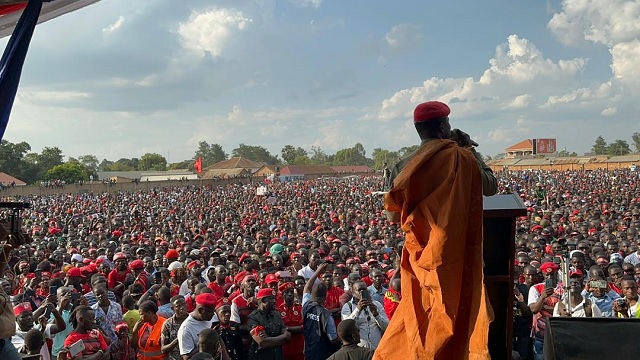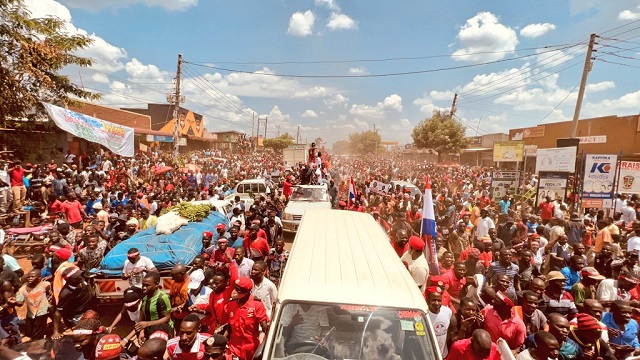
Opposition leader’s tours raise questions about 2026
COVER STORY | IAN KATUSIIME | Since unexpected crowds at his mobilisation campaign brought Mbarara City in western Uganda to a standstill and security agencies did not bother to arrest or stop him, Bobi Wine has become the headline topic across the country.
With the next election still three years away in 2026, the intensity of Bobi Wine’s early move and the government’s reaction or the lack of it has raised questions. Why such big rallies now? Why is he not being stopped by security agencies as has happened in the past? Where does the money to fund all the activities come from?
The party led by Bobi Wine (real name Robert Kyagulanyi); the National Unity Platform (NUP), appears aware of the ever shifting voter dynamics in Uganda since it was a beneficiary of those same dynamics in the last election when it returned impressive margins in the Buganda region–felling ruling party MPs and party leader Bobi Wine polling 3.6million votes in the 2021 presidential election; a first for a debutante.
So this mobilisation tour has become a rallying call inside the party trenches as thousands of supporters turn up in party colours chanting party slogans. NUP is hoping to replicate or even perform better than in the previous election where it had 59 MPs elected and swept division mayor positions and councillorships in Kampala.
Bobi Wine is expected to be a candidate in the 2026 presidential race but he previously appeared to have fizzled out as political attention was fixed on the activities of the so-called MK Movement of President Yoweri Museveni’s son, Gen. Muhoozi Kainrugaba and the tussle for leadership in the other big opposition party, the Forum for Democratic Change (FDC).
His tour comes on the back of Muhoozi’s recent rallies in Bukedea and Soroti where the president’s son has repeatedly said he is campaigning for the presidency in 2026 although his father, Museveni, is also in the race.
But Bobi Wine’s meet-the-people support mobilisation events of the leader of Uganda’s largest opposition party, themed as Zukuka Uganda (Wake Up Uganda), that have seen crowds in red thronging towns in all regions of the country to welcome him, appear to have ignited an additional spark.
Even the leader of another former leading party, the Uganda Peoples Congress (UPC), Lira City East Division East MP Jimmy Akena, has caught the bug and announced he is considering running for the presidency in 2026.
The move by Akena, who is the son of Milton Obote; the UPC founder and former president of Uganda, is the latest indication since the Electoral Commission released its roadmap that the 2026 presidential race is on.
Akena who was on Sept.09 visiting the gravesite of his father in Akokoro Sub-county in the neighbouring Apac District appears to have been moved by the gathered crowds and the various UPC leaders who urged him to vie for the presidency.
Until now, Akena has appeared comfortable as a “partner” of President Museveni and his ruling NRM party but many of those who spoke at the gathering at the Apac Boma Grounds said they want to see the lost glory achieved during UPC’s leadership under the late former president Apollo Milton Obote. They said only UPC can restore that.
Weighing East and West
Bobi’s tour has also made waves for two other reasons. Western Uganda where he started is the part where he got the lowest votes as the region turned up resoundingly in favour of the incumbent. On the other hand in eastern Uganda, Bobi and his party did well trouncing Museveni in parts of Busoga which the latter always carried.
In the eastern region, Bobi Wine scored 34% against Museveni whose margins dropped from 58% in the 2016 elections to 54% in 2021, according to the Uganda Elections Data Portal (UEDP), a data visualisation tool by the International Republican Institute, which sources its data from the Electoral Commission.
Bobi Wine won in major districts of Mbale, Jinja, Iganga, Bugiri, Busia while Museveni retained districts in the Teso sub region which include Katakwi, Soroti, Bukedea, Pallisa while Bobi, new on the political scene, made in-roads in the Busoga and Bamasaba sub-regions which were traditionally Museveni strongholds.
According to the portal, 500,000 votes separated Museveni and Bobi Wine in the eastern region. The performance in these regions is instructive because he was able to attract voters as a new candidate much as there was a lower voter turnout in both regions compared to 2016.

Since 2021, the grassroots and lower rungs of the electorate, NUP has been on a steady path winning guild elections across universities in the country. In December 2022, Lawrence Alionzi, a NUP candidate won the Makerere University guild race beating seven candidates to become the 88th guild president.
Alionzi’s predecessor, Shamim Nambassa, was also on the NUP ticket and defeated her FDC counterpart by over 4000 votes in November 2021. NUP has also won guild presidential races in Makerere University Business School (MUBS), Kyambogo University and Mbarara University of Science and Technology (MUST).
Starting in Mbarara City in western Uganda on Aug. 28, Bobi Wine traversed Fort Portal, Kasese and Kabale, before swinging to eastern Uganda and combing through the districts of Jinja, Mayuge, Mbale, and Busia. He then headed north before returning to central. In some places such as Mbale, excited crowds dressed him in ceremonial bark cloth and tribal regalia as marks of support.
In what has turned into the largest mobilisation effort by NUP since the 2021 elections, after Lira, the NUP tour turned to Luweero where Bobi Wine said people in the area are “suffering from unhealed trauma and broken promises.”
The NUP tour is expected to go deeper in the Buganda region that includes Kampala where the government may not sit back and let the rallies go on.
The Buganda region where Bobi Wine hails from was his trump card in the 2021 election polling 1.9million votes which was 64% of the votes cast compared to Museveni’s one million votes at 33% in the area. This region has 16 districts which includes the capital Kampala, populated districts like Masaka, Mityana and NRM’s Mecca, Luweero.
Bobi Wine beat Museveni in the district where the President centred his five year guerilla war from 1981-1986. Bobi polled a massive 70% where registered voters were 257,115 against Museveni’s 27%.
Museveni had comfortably carried the district for years when he was challenged by Kizza Besigye, a Bush War comrade, who had stints in government before breaking ranks. Museveni fought off a stiff challenge from the People Power leader to win districts in the outer belt of the Buganda region like Sembabule, Nakaseke, Rakai, Mubende but terribly lost the districts in Buganda’s heartland like Masaka, Mpigi, Gomba, Mukono and Kayunga which are also more populated.
In the Central region, voter turn-out fell from 61% to 54% according to the UEDP. In the Eastern region, it fell from 69%-60%. Many analysts attributed it to the violence that the state meted out on Bobi Wine’s campaign.
Some NRM ministers attributed their election losses to the brutality the state unleashed to bring Bobi’s campaign to heel.
This time, Bobi Wine has launched NUP offices in Mbarara, Lira, Luweero. He was flanked by party leaders like secretary general Lewis Rubongoya, spokesperson Joel Ssenyonyi, MPs Francis Zaake and party diehards in areas he visited.
At all his stops, Bobi Wine, told rallies that Ugandans must resist the long rule of President Yoweri Museveni.
“The power is in your hands and this tour is meant to charge you,” he told them.
He equally said Ugandans must resist Museveni’s plans to have his son, Gen. Muhoozi, to take over the presidency after him.
“It’s game over for Museveni and he is now trying to impose his son on us,” he told a crowd in Mbale City.
Bobi Wine also reminded the crowds about the killing of Ugandans by security forces protests broke out following his arrest during the previous election campaigns.
Security stays away
There has been speculation as to why the state and its security has allowed Bobi Wine to hold NUP rallies and not broken them up as has been the fashion.

NUP launched a mobilisation tour in February but it fizzled out. Dubbed Kunga Uganda (Mobilise Uganda), it attracted hordes of supporters, party MPs, and other well-wishers.
Mathias Mpuuga, a NUP top honcho, and the Leader of Opposition in Parliament (LOP) said the Kunga campaign was meant to mobilise and recruit new supporters and train them with a view to eventually deploy eventually well identified and oriented individuals to represent this party at different stages in 2026.
“At the last election, we had so many Ugandans voting for us…but we were not sure whether we were being voted for by supporters or members,” he said.
At the time, the mobilisation looked timely because the party appeared to be in the headlines following the release on bail of its two critically ill MPs; Mohammed Ssegirinya and Allan Ssewanyana, after a gruesome jail stint.
The detention of the two MPs had become a lightning rod in parliament and the country’s body politic on alleged tramped up murder charges.
Bobi Wine, their leader, had come under fire when he delayed to release a statement on the MPs’ new found freedom amidst allegations that they had cut a deal with Museveni.
But the tour did not go beyond the party headquarters in Kavule, Makerere not far from Kampala’s central business district where it was launched. When the party Chairman for Mobilsation, Fred Nyanzi Ssentamu, attempted to take the campaign to western Uganda, police roughed him up in Kyenjojo and detailed at least five NUP leaders from the area. The party later called off the mobilsation drive. Fear of disruption by state security agents could have been a factor in the cancellation.
During the 2021 presidential election campaigns, Bobi Wine’s campaign got a national awakening when security agents shot at his car and pounced and arrested him for allegedly flouting Covid-19 protocols that were in place at the time. The event led NUP supporters to stage violent protests in major towns across the country and the security agents responded with fire. In Kampala alone, security shot dead over 100 people by some counts and injured more–although the actual number of Ugandans who died in the protests remains unclear.
This time, although it has not been plain sailing (Radio Endigyito 88.3 FM appears to have gone off air as soon as he entered the studios) but police looked on as the party entourage rolled into Mbarara for the launch of the tour. The state security briefly blocked Bobi Wine’s party procession in Kabale but his rallies have gone on un-intercepted.
At a time of a military coup frenzy in Africa, the Ugandan state and its machinery have retreated from confrontations with opposition gatherings across the country. Bobi Wine is said to have hinted as much in an interview with BBS TV when he was in Jinja City, eastern Uganda. He said a recently released film that documented the brutality he endured at the hands of state agents in the 2021 election was one of the reasons for his free movement today.
“In the past election, we had a documentary where we recorded all the evidence on camera and we took it to the world,” he reportedly said, “The film is now showing in cinemas across the US and Europe and will be on Netflix starting next month (October).
“We also took this evidence to the International Criminal Court (ICC) and now Museveni can really feel the ICC rope around his neck. We believe this is the reason… because he is not stupid, that is why you see he is behaving the way he is,” Bobi Wine reportedly said.
When asked to explain the change in tactics; from confrontation to observation, state agents such as the Resident City Commissioner (RCC) of Mbarara City, retired army Col. James Mwesigye, have fumbled for a reply.
“We handled him professionally and he went in peace,” Mwesigye is quoted to have told journalists in the area. In other words, the security are not privy to the reasons for the order from above to let Bobi Wine roam free or it’s too embarrassing to talk about. In any case, it’s not clear how long it will last.
 The Independent Uganda: You get the Truth we Pay the Price
The Independent Uganda: You get the Truth we Pay the Price






So far so good as the govt restraint has enhanced its democratic credentials whatever remains of it. The big test remains to be the rally in Kampala whether it will be tolerated. Having kept its cool and silenced some of its critics, the government may as well sit it out and let pass it peacefully.
Sometimes an astute person will give you a rope to hang yourself!!!